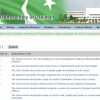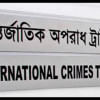Jamaat against legal process
Motiur Rahman Nizami enjoyed every opportunity to defend himself against the charges of war crimes and crimes against humanity.
The Jamaat-e-Islami chief, however, in every step of the way failed to cast doubt over him being guilty.
The highest court of the country upheld his death penalty he was awarded by an international crimes tribunal for committing crimes against humanity and genocide.
And after exhausting all legal process, he was executed early Wednesday.
It took around seven years to complete the legal process, from his arrest to execution. None should say that the trial had been done hurriedly.
Yet, his party Jamaat-e-Islami could not accept the outcome of the trial.
In a statement issued to announce a nationwide hartal for today, the party alleged that the government "killed" him through a conspiracy and it would be marked as a "dark episode" in Bangladesh's political history.
Like Nizami, other Jamaat leaders -- Ali Ahsan Mohammad Mojaheed, Abdul Quader Mollah and Kamaruzzaman -- who were convicted and executed for their war crimes had enjoyed the same legal opportunities to defend themselves.
But they failed to even cast doubt over them being guilty.
During the trials, Jamaat leaders and other accused were given the right to appeal against the tribunal verdict by the amendment of the law -- the International Criminal (Special Tribunal) Act, 1973.
The original law under which they were tried did not have the provision for a convict to file an appeal with the Appellate Division of the Supreme Court.
In addition, the apex court disposing of a review petition filed by Jamaat leader Quader Mollah crated the precedence which allowed other war crimes convicts to file such petitions against the court's own judgments on appeals.
But nothing could satisfy Jamaat.
It has already enforced at least 42 days of countrywide hartals since 2013 to denounce the verdicts delivered by courts and against Jamaat leaders' executions.
The hartal came in the same pattern. Whenever a tribunal delivered a verdict convicting any of its leaders, it enforced hartals.
Later, the party leader challenged the tribunal verdicts by filing appeals with the Appellate Division. When the apex court upheld the tribunal verdicts with some slight changes in a number of cases, Jamaat again called hartals.
After the conviction of Jamaat leader Delwar Hossain Sayedee, Jamaat-Shibir men waged violent street agitations and clashed with law enforcers in February 2013. At least 33 people, including four policemen, were dead the day the verdict was delivered.
The death toll rose further in the following days as Jamaat-Shibir men continued violent demonstrations and engaged in clashes with law enforcers.
What message Jamaat has been giving us by enforcing repeated hartals and indulging in violent protests?
If one is dissatisfied with a court's verdict, he can express his dissatisfaction. But the expression must be acceptable and rational and according to the law.
Enforcement of hartals is a clear manifestation of non-acceptance of the court's verdict whether it was delivered by the tribunal or the apex court exercising the judicial powers of the state.
The implication of non-acceptance of the legal system, in view of jurist Shahdeen Malik, is non-acceptance of the state.
Then can we not say that Jamaat has been denying the existence of independent Bangladesh by enforcing hartals to denounce the country's judicial power?
This reminds us of Jamaat's role in 1971 when the party not only opposed the Liberation War, its leaders and followers had taken up arms to prevent the birth of Bangladesh.
For the crimes the party had committed in 1971, it was banned in independent Bangladesh. But the political changeover in 1975 paved the way for its revival. It formally resumed its activities in 1979.
Since then it has been in politics. But it never apologised for its wrongdoings. It also did not have to face trial. Two of its leaders, Nizami and Mojaheed, even became ministers in 2001, thanks to our polluted political culture.
All these raise a crucial question: Do Jamaat and its leaders want to be above the law?

 For all latest news, follow The Daily Star's Google News channel.
For all latest news, follow The Daily Star's Google News channel. 








Comments